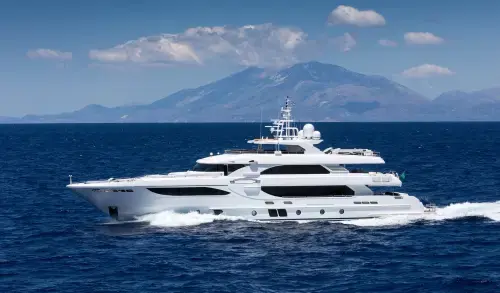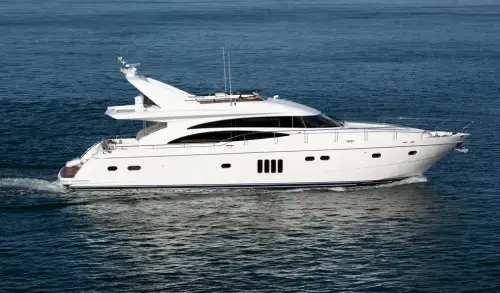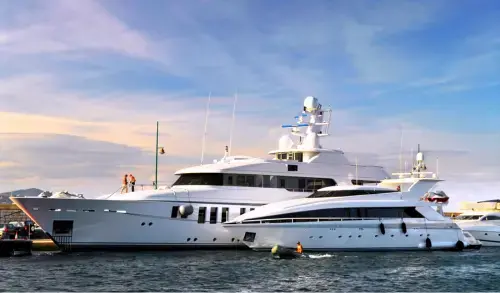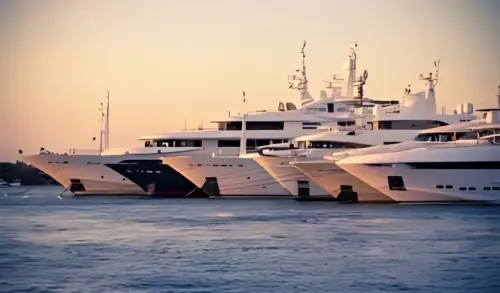Advantages of Locating the Shore Power Frequency Converter in the Engine Room
For modern yachts, power systems demand more than compatibility; they require precision, thermal efficiency, and smart integration with onboard...
3 min read
Atlas Marine Systems : Aug 20, 2025 9:47:00 AM

Some shore power frequency converters deliver years of reliable performance with minimal issues, while others fail prematurely, often when you can least afford it. For marine operators, the difference between a long-lasting converter and one that falls short can mean the difference between smooth sailing and costly downtime.
In this article, we’ll explore the factors that impact a frequency converter's lifespan on yachts. From environmental stress and build quality to maintenance and real-world operating demands, we’ll break down what separates durable systems from those that fail too soon.
Marine environments are among the harshest operating conditions for electrical equipment, and shore power frequency converters are no exception. Exposure to salt air, humidity, heat, and constant vibration puts long-term stress on every component inside the unit.
Salt, Humidity, and Corrosion - Salt-laden air and moisture accelerate corrosion on PCB boards, terminals, fans, and connectors. Discover why some shore power frequency converters fail early while others last for years in demanding marine environments.
Heat Exposure - Engine room heat stresses capacitors and semiconductors. Prolonged exposure shortens component life, especially in poorly ventilated or high-demand installations.
Vibration and Mechanical Stress - Constant motion and engine vibration can crack solder joints and loosen connectors, leading to long-term reliability issues if not properly managed.
These environmental factors are often the first contributors to early failure, making marine-specific design and installation essential for long-term reliability.
While environmental conditions play a major role in converter lifespan, the internal design and build quality are just as critical. Not all shore power frequency converters are engineered to the same standard, and the differences often reveal themselves over time.
Long-lasting converters use high-quality, heat-rated components such as 105°C-rated capacitors, industrial-grade fans, and rugged PCB assemblies designed to withstand thermal cycling and mechanical stress. Lower-cost units may meet basic performance specs but fail prematurely when components are pushed to their limits.
Effective cooling is essential to prevent overheating. High-end converters typically feature oversized heat sinks, active fan control, and optimized airflow paths to dissipate heat efficiently, even in confined engine room spaces.
Shore power inconsistencies are common in global marinas. Converters designed for marine use often include galvanic isolation transformers, surge suppression, and voltage regulation to protect onboard systems from unstable or dirty shore power.
Some converters are built to just meet specifications, while others are engineered with extra headroom to ensure longevity under real-world conditions. Choosing a converter from a manufacturer that prioritizes long-term performance over minimal compliance can make a significant difference in operational life.
Advanced converters rely on firmware to manage thermal protection, load transitions, and fault detection. Well-engineered control software helps protect components by preventing overstress conditions and supporting smoother operation over time.
Entry-level converters may meet baseline performance specifications during initial operation, but often rely on lower-cost components that degrade rapidly under load or in harsh marine environments. For those evaluating systems in mission-critical or continuous-use applications, reliability metrics such as MTBF (Mean Time Between Failures) and compliance with environmental testing protocols can provide valuable insight into real-world durability and design integrity.
No two yachts operate the same, and real-world usage plays a major role in how long shore power frequency converters last. Vessels that frequently switch between shore power and generators experience constant load transitions, putting extra stress on converter components and control systems.
Yachts running high-draw systems, such as air conditioning, galley equipment, and stabilization, also place continuous demand on the converter. Operating near full capacity for long periods accelerates wear on sensitive components.
These factors make vessel usage just as important as equipment quality. Liveaboard yachts, charter vessels, and long-range cruisers typically put converters under heavier strain than seasonal or short-range boats. Understanding these conditions helps operators choose converters built to handle continuous marine duty.
Even the best-designed shore power frequency converters require regular maintenance to achieve their full service life. Neglecting basic upkeep is one of the most common reasons otherwise reliable systems fail prematurely.
Regularly cleaning vents, fans, and internal assemblies helps maintain proper cooling and prevents long-term environmental damage.
Replacing worn or failed cooling components before they impact performance helps prevent overheating and extends the lifespan of internal electronics.
Periodic inspections of capacitors, connectors, and circuit boards allow crews to catch early signs of degradation.
Many modern converters include built-in diagnostics and fault logging. These systems give crews real-time visibility into performance trends, allowing maintenance teams to act before minor issues become major problems.
Choosing the right frequency converter isn’t just about meeting today’s power needs; it’s about investing in long-term reliability. From environmental stress and component quality to maintenance and operating demands, every factor plays a role in how long a converter will last on board your yacht.
Atlas Marine Systems designs shore power frequency converters specifically for the marine environment, built to withstand the challenges of global operation. Our solutions combine advanced engineering, proven durability, and expert support to keep your vessel powered safely and reliably for years to come.
Contact us today to learn more about our converter solutions or to speak with a marine power specialist about your vessel’s unique requirements.

For modern yachts, power systems demand more than compatibility; they require precision, thermal efficiency, and smart integration with onboard...

Marina shore power is often unpredictable. Voltage fluctuations, frequency mismatches, and electrical surges can compromise critical onboard...

The ShorPOWER SHF system is one of the most dependable and versatileelectrical shore power convertersystem models available today. The ShorPOWER...